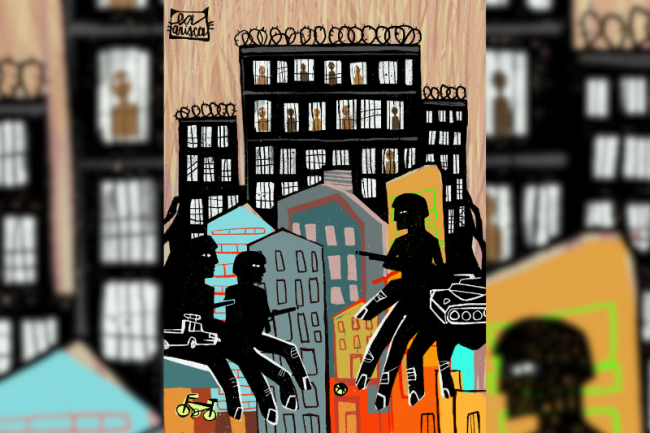
Since February 2021, eleven massacres have occurred in Ecuador’s prisons, resulting in the deaths of more than 400 inmates under gruesome circumstances. The crisis in Ecuador’s prisons is the center of gravity of a troubled state driven by a pervasive and unsettling insecurity crisis that threatens to unravel the nation’s democracy. On August 9, only eleven days before Ecuadorans went to the polls for snap elections, presidential candidate Fernando Villavicencio was killed as he left a political rally. The assassination has turned the October 15 presidential runoff between the Correa-aligned candidate Luisa González and businessman Daniel Noboa into a theater of conspiracies feeding anger and distrust to an already divided electorate.
This year, several candidates for office and public servants have been either killed or have survived murder attempts. While it can be difficult to distinguish between ordinary crime and political violence in the dense murk of this moment, it appears that politically motivated killings are on the rise. The participation of police personnel in some of the attacks has given way to a growing perception of policing as an institution associated with organized crime.
When did policing go awry in Ecuador? One way of approaching this question is to examine the development of protection rackets from within prisons and the involvement of the police in partisan politics. This profound crisis in policing is characterized by the misuse of law enforcement resources such as prison intelligence and police surveillance. On one hand, the circulation of prison intelligence to purposely misinform the public became evident with the failure of the Commission for Penitentiary Dialogue and Pacification created by President Guillermo Lasso on December 16, 2021. After drug trafficker Leandro Norero was killed in Cotopaxi's supermax prison, a series of police intelligence reports were leaked to the press and political influencers via WhatsApp. These reports portrayed commissioner Claudia Garzón as a member of Ecuador's largest criminal organization, although she was a senior advisor to national police director Pablo Ramirez, who was charged with the administration of the prison system.
On the other hand, law enforcement resources have been weaponized to criminalize democratic dissent by mobilizing police intelligence reports to initiate criminal proceedings in the context of social protests. According to an Ombudsman investigation, the police abused their power and violated human rights during the 2022 general strike in which the Confederation of Indigenous Nationalities of Ecuador (CONAIE) led mass protests against austerity and extractivism. During this 18-day long national strike, over 400 criminal cases were opened against protesters. The Ombudsman report suggests that public security authorities promoted hateful speech through racist narratives and false criminal accusations against Ecuador’s Indigenous movement and other grassroots organizations.
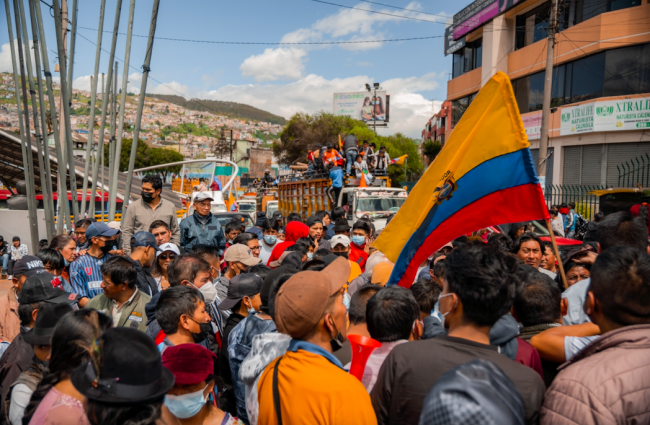
The Rise of Protection Rackets
The night before the August 20 general election, Francisco Tamariz, a coastal city mayor, was shot multiple times at a police checkpoint as he moved in a personal vehicle. In a live Facebook broadcast minutes after the incident, the victim claimed his assassins were undercover police operatives. This murder attempt is not the only criminal case involving the police that is under investigation. From January 2018 to October 2022, almost two thousand police officers were jailed for different crimes, including drug trafficking, smuggling weapons into prisons, and a staggering number of femicides.
Protection rackets are violent extortion networks undermining the power and legitimacy of democracy. They are basic forms of criminal governance utilizing real statecraft that can be found in different Latin American countries, albeit with significant variations. A common feature of this organized crime formation in the region is the rackets’ capacity to develop patronage networks by accessing state resources. For everyday citizens it is sometimes hard to tell racket and the state apart in the provision of social and public services.
Amid Ecuador’s insecurity crisis, protection rackets arose out of prison gangs empowered by police intelligence. What began as an antinarcotics intervention instead became leverage for crime bosses to control entire penitentiaries and infiltrate the police. As the country’s prisons turned into drug cartel strongholds, newly formed protection rackets took over the streets and started an extremely violent turf war for pockets of criminal sovereignty in major cities. In the process, small businesses and local authorities became targets of racketeering groups acting on behalf of prison gangs. The most organized and largest protection racket operates out of Guayaquil’s penitentiary, but it is not the only one. Across the country, prison-franchised criminal networks recruit public authorities—not only police officers—to extort citizens and profit from the dismantling of the state.
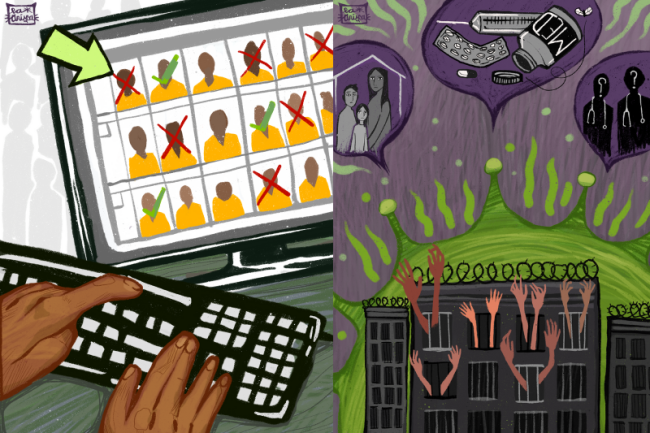
The logic of protection racketeering became particularly evident during the elections, as the concept of extortion gained currency among first-round candidates. For instance, in a recent interview the tough-on-crime candidate Jan Topić accused the anti-corruption campaigner Christian Zurita of running an extortion operation that offers “media protection” to large-scale businesses and high-profile politicians. This is just one example of how the power to impose “protection” services has become a tool in Ecuadorian politics, a country where everyone seems to trick everyone else, and democracy has become synonymous with criminal governance.
In an election dominated by fears of extortion and violence, the decomposition of politics has also reached the digital public sphere. The police force now shares organized crime narratives on social media to steer the national conversation about insecurity and crime towards a constant increase of police firepower and discretionary violence in the contexts of social mobilizations and the "war on drugs."
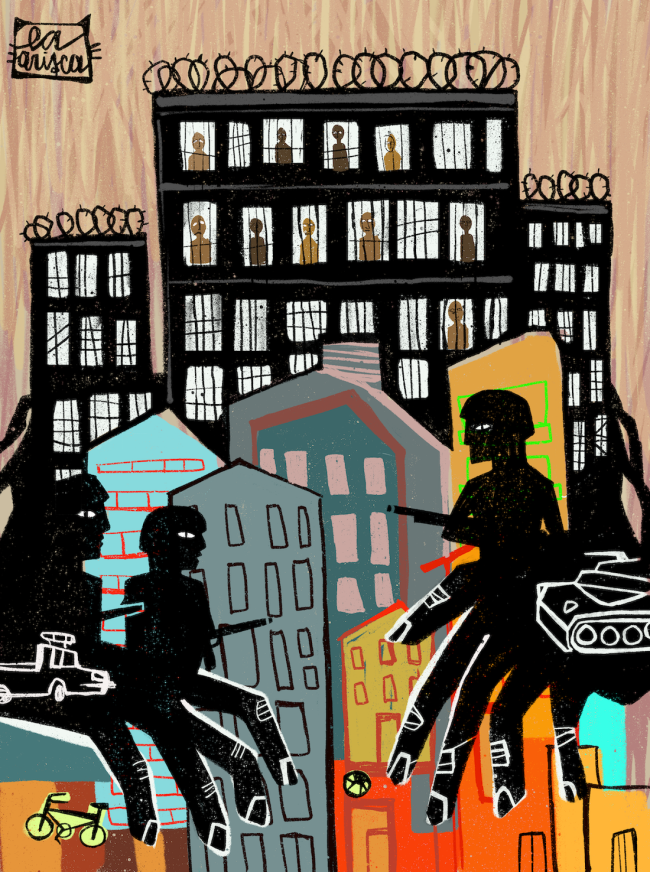
Police Intelligence Goes Viral
The insecurity crisis has rearranged Ecuador’s social media landscape around the emergence of police intelligence as a ventriloquist of political influencers in search of viral moments. Back in May 2023, as President Lasso dissolved the legislature amid impeachment proceedings, social media commentators began to replicate half-baked stories fed directly by the police. For example, some influencers referenced police intelligence reports to suggest that an Indigenous leader and a popular leftist organization were involved in organized crime. Through insult-driven engagements often targeting leftist and Indigenous groups, this new breed of social media “spin doctors” provides lip service to a police force that has closed ranks to support the Lasso government.
As the president’s power dwindled, corruption scandals within his cabinet and his family mushroomed, and extreme violence escalated. This escalation was fed by fame-hungry influencers who gained significantly more access to criminal investigations—to the extent that some have shared highly sensitive and classified information about prison gangs and drug trafficking dynamics. It would be a mistake to assume that Ecuador’s police intelligence functions as a centralized and coherent puppet master. Police intelligence ventriloquism on social media is multiple, paradoxical, and even chaotic. It operates more like a business model than a political strategy. Think of it as a bazaar of politically motivated leaks offered to a select group of social media influencers who pick and choose stories according to their interests and styles. These narratives—both legitimate and falsified—serve to confuse and deflect from the complicity of the state and security forces in perpetuating corruption and organized crime.
The police have forged strong ties with far-right libertarian groups since 2017. However, a segment of the force maintains patron-client relations with former left-leaning government authorities, who also leak classified information to the public on social media. Far-right influencers focus their efforts on authoritarian agendas that praise violent policing against Indigenous groups and popular organizations and frame these groups as instigators of violence. For instance, during the 2022 general strike, many social media commentators joined the former Minister of the Interior Patricio Carrillo in claiming that the protests were funded by drug cartels. This accusation was never proven, and Carrillo was later disqualified by the national assembly and barred from holding public office for two years. The same influencers advocate for the ease of gun access and a pro-extractive agenda based on an expansion of oil production and open-pit mining. Many of them also use decontextualized police intelligence to blame the spike in violence on former president Rafael Correa.
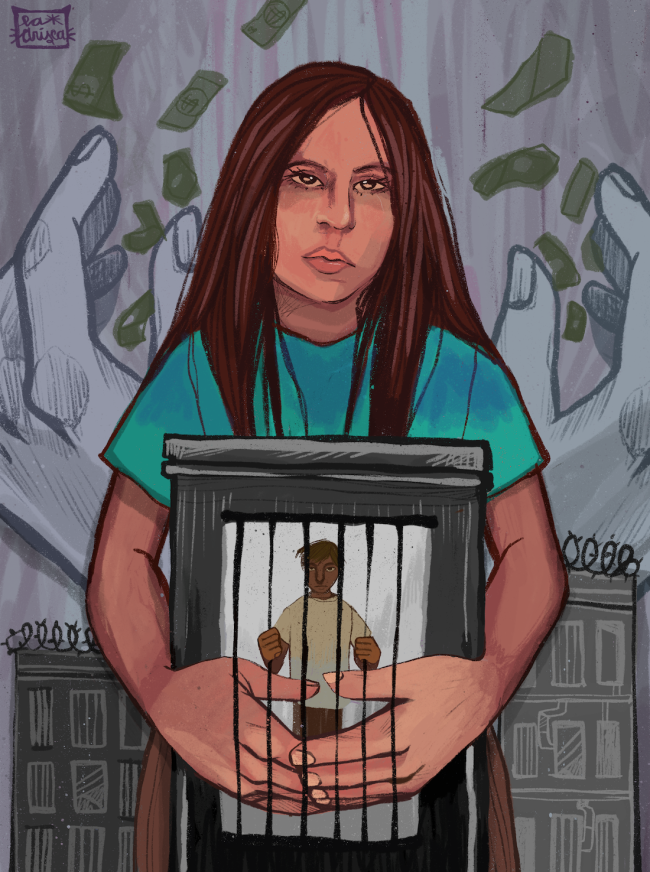
The alignment of far-right influencers and police intelligence evolved in tandem with the formation of protection rackets behind bars. Both phenomena are entangled with common understandings of race premised on colonial ideas of mestizaje—namely, a racial concept that hides structural forms of racism by framing ethnicity in terms of mixture or hybridity. The police are mostly low-middle-class Catholic mestizo men from the highland region. Over the course of the last decade, the police underwent several reforms, yet it was never de-militarized or transformed in terms of its racial and ethnic makeup. The institution continues to operate through a rank-based command structure that mimics the military hierarchal organization of obedience and subordination and reproduces a racial hierarchy that favors whiteness and systematically discriminates against Black and Indigenous populations. These colonial ideas of race and mestizaje translate into official narratives that characterize Indigenous-led protests as "irrational" and violent, which resonate quite strongly with the racism of the far right. What is at stake is how the criminalization of social protests works in tandem with a process of racialization that only accepts "mestizo" politics as democratic and legitimate.
Due to this intricate interplay of protection rackets, police intelligence, and political influencers, the rampant dissemination of disinformation looms large in Ecuador. False narratives are proliferated through communication channels, primarily social media and chat groups like Whatsapp and Telegram, and they cloud public comprehension and heighten existing divisions. Besides the need to address the sources of misinformation and disinformation, there is also a need to educate citizens on media literacy and fact-checking mechanisms to counteract false news propagation.
Against this backdrop, the new government will face a profound crisis in policing and imprisonment that cannot be solved with the expansion of law enforcement mechanisms as they currently operate, or a purge of police officers involved in drug trafficking. In Ecuador, extortion racketeering has become the bedrock of antidemocratic politics and authoritarian libertarianism that also reinforce systemic racism. The great challenge is to dismantle the parallel infrastructures of criminal governance put in place both inside and outside prisons as well as inside and outside government.
Jorge Núñez holds a PhD in Anthropology from the University of California, Davis, is cofounder of Kaleidos at the University of Cuenca, and co-director of the Ecuadorian Prison Observatory 593. He is also the lead designer of the digital platform EthnoData. Jorge is currently a visiting scholar at SUM – Center for Development and the Environment at the University of Oslo, Norway.
Emilia Salazar is an illustrator who likes to transform words into images. You can find more of work on her Instagram @laarisca_ilustracion.

